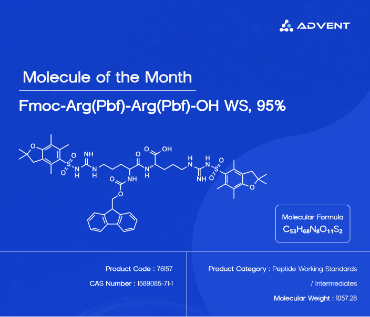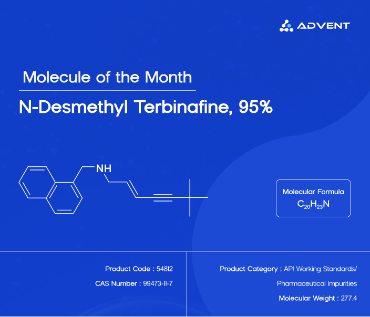In medicinal chemistry, innovation often lies at the intersection of nature and design. The flavanone scaffold—a key structure found in numerous plant-derived bioactives—has long been recognized for its antioxidant and anti-inflammatory potential. By modifying this naturally inspired core, scientists continue to discover molecules that deepen our understanding of oxidative balance, inflammation, and cellular defense.
For November 2025, Advent spotlights Flavanone Diacetyl Hydrazone (FDH) as its Molecule of the Month—a semi-synthetic derivative that exemplifies this convergence of biology and chemistry.
Chemically known as N-acetyl-N′-(2-phenyl-2,3-dihydro-4H-chromen-4-ylidene)acetohydrazide, FDH is part of a growing class of flavanone hydrazones that have shown promising redox and biological behavior in pre-clinical research.
Understanding the Chemistry Behind FDH
FDH represents a flavanone–hydrazone hybrid, where the incorporation of a diacetyl hydrazone moiety onto the flavanone core enhances its electron-donating capacity and potential for molecular interaction.
Studies on related flavanone hydrazones have demonstrated that this chemical architecture supports free radical scavenging and metal-chelating activities—two mechanisms central to managing oxidative stress.
Research published in journals such as Molecules and Bioorganic & Medicinal Chemistry Letters has noted that similar hydrazone derivatives can stabilize reactive oxygen species (ROS) through hydrogen atom donation and conjugation effects, thereby reducing oxidative damage to biomolecules.
While peer-reviewed data specific to FDH remain limited, the molecule’s design is consistent with those structural patterns. In essence, FDH is engineered to act as a potential antioxidant probe, useful in understanding how small molecules influence cellular oxidation–reduction pathways.
From Oxidation to Inflammation: Why It Matters
Excessive ROS levels can disturb the balance of biological systems, contributing to oxidative stress, inflammation, and eventual tissue damage.
Flavanone derivatives, particularly those with hydrazone linkages, have been reported to modulate key enzymes and cytokines involved in these responses—such as nitric oxide synthase (NOS), cyclooxygenase (COX), and tumor necrosis factor (TNF-α).
These interactions make compounds like FDH valuable tools in biomedical research, especially for scientists exploring the mechanistic links between oxidative stress and chronic inflammatory conditions.
Early screening on analogous compounds has indicated relevance in research related to neurodegenerative, cardiovascular, and metabolic processes. FDH, by virtue of its hybrid structure, can serve as a reference standard or model compound in such exploratory studies—helping researchers map biochemical responses in redox-regulated environments.
Analytical Excellence at Advent Chembio
At Advent Chembio, FDH has been meticulously developed and characterized, reflecting the company’s hallmark precision and purity standards.
The compound has been successfully scaled from milligram to gram levels and is offered at >98% purity, suitable for both analytical and preparative applications.
Each batch of FDH is supported by a comprehensive characterization dossier, including:
¹H NMR (Proton Nuclear Magnetic Resonance): Confirms hydrogen environments and overall molecular integrity.
Mass Spectrometry: Validates molecular weight and confirms structural identity.
Infrared Spectroscopy (IR): Identifies key functional groups, notably the hydrazone (C=N) stretch and carbonyl vibrations.
Thermogravimetric Analysis (TGA): Establishes thermal stability and moisture content, essential for long-term storage.
By ensuring reproducibility across every analytical parameter, Advent Chembio provides a Working Standard that meets the expectations of pharmaceutical R&D teams, CROs, and academic laboratories worldwide.
Scaling Science Responsibly
Scaling a molecule from the bench to bulk requires not only technical expertise but also a commitment to purity, process consistency, and regulatory readiness.
FDH’s scalable synthesis underscores Advent Chembio’s strength in semi-synthetic chemistry, enabling reliable supply for research programs that demand analytical continuity.
The company’s state-of-the-art facility integrates Good Laboratory Practices (GLP) and robust Quality Management Systems (QMS), ensuring every compound—FDH included—aligns with international quality benchmarks.
This precision-driven approach has made Advent Chembio a preferred partner for pharmaceutical organizations seeking reference materials and impurities that meet stringent analytical and documentation standards.
Positioning FDH for Future Research
Although Flavanone Diacetyl Hydrazone itself remains relatively new to the published domain, its structure resonates strongly with the broader field of flavonoid hydrazones, which have shown potential across oxidative and metabolic studies.
By offering FDH as a high-purity working standard, Advent Chembio invites researchers to explore its behavior in diverse settings—from redox assays to stability studies, and from analytical calibration to structure–activity investigations.
Its well-defined analytical profile, combined with the company’s reproducible synthesis route, makes FDH an ideal candidate for comparative studies in antioxidant screening, enzyme modulation, and inflammation research.
In this way, Advent Chembio contributes not just a compound, but a foundation for new scientific exploration—enabling chemists and biologists alike to probe the fine balance between oxidation, inflammation, and cellular longevity.
Conclusion
Flavanone Diacetyl Hydrazone (FDH) embodies the synergy between natural inspiration and synthetic precision.
Its unique hybrid structure, derived from the well-studied flavanone core, reinforces the scientific pursuit of molecules that can shed light on fundamental redox and inflammatory mechanisms.
With >98% purity, mg-to-g scalability, and complete analytical validation, Advent Chembio delivers FDH as both a research-enabling molecule and a testament to the company’s enduring commitment to scientific rigor.
As Advent Chembio continues to expand its portfolio of high-value molecules, FDH stands as a symbol of that mission—helping bridge discovery and application, one compound at a time.




